Lifelong
commitment to a balanced diet transcends mere weight loss, embedding a foundation of health and well-being that supports our physical, mental, and emotional states throughout every stage of life.
Table of Contents
Introduction to Balanced Diet
A balanced diet is essential for lifelong health and well-being, providing the body with a comprehensive mix of nutrients necessary for its optimal functioning. More than a tool for weight management, a balanced diet is a cornerstone of a healthy lifestyle, offering benefits ranging from enhanced physical health to improved mental well-being.
Nutritional Balance and Lifelong Impact on Health
Understanding the balance between macronutrients and micronutrients is crucial for sustaining health throughout one’s life. This commitment to nutritional balance prevents nutritional deficiencies and supports bodily functions at every stage, from childhood through to older age. A diet rich in a variety of nutrients can fend off diseases that often accompany aging, making the adherence to a balanced diet a key to health.
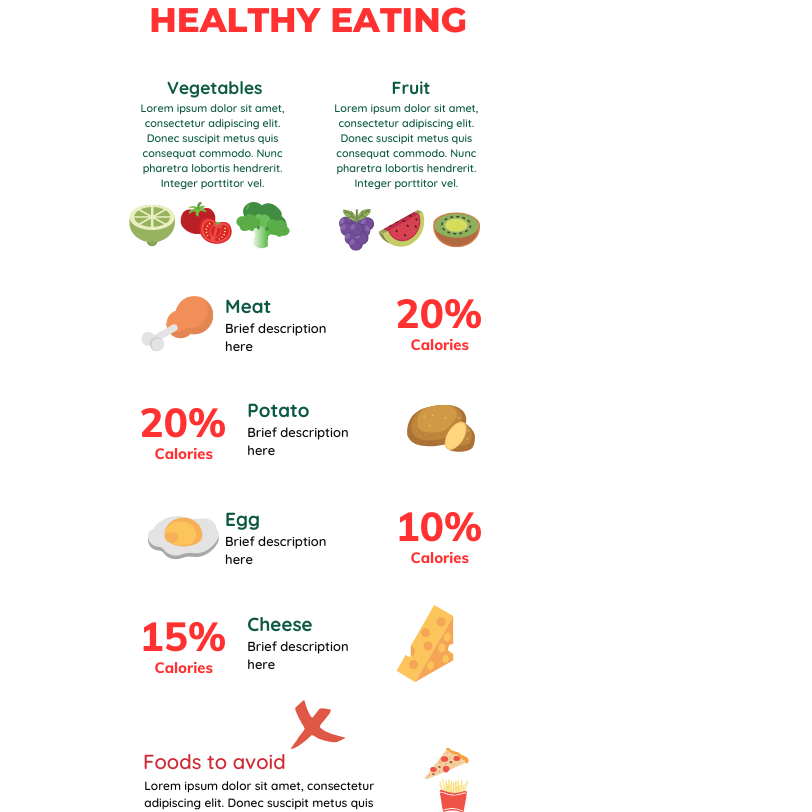
Mental Health and Lifelong Cognitive Benefits
A balanced diet affects not only our physical health but our mental health too, benefits that influence mood, cognitive function, and overall brain health. Lifelong consumption of key nutrients like omega-3 fatty acids, antioxidants, and vitamins can significantly reduce the risk of developing cognitive impairments and mental health disorders later in life. Thus, maintaining a balanced diet is paramount for mental clarity and emotional stability.
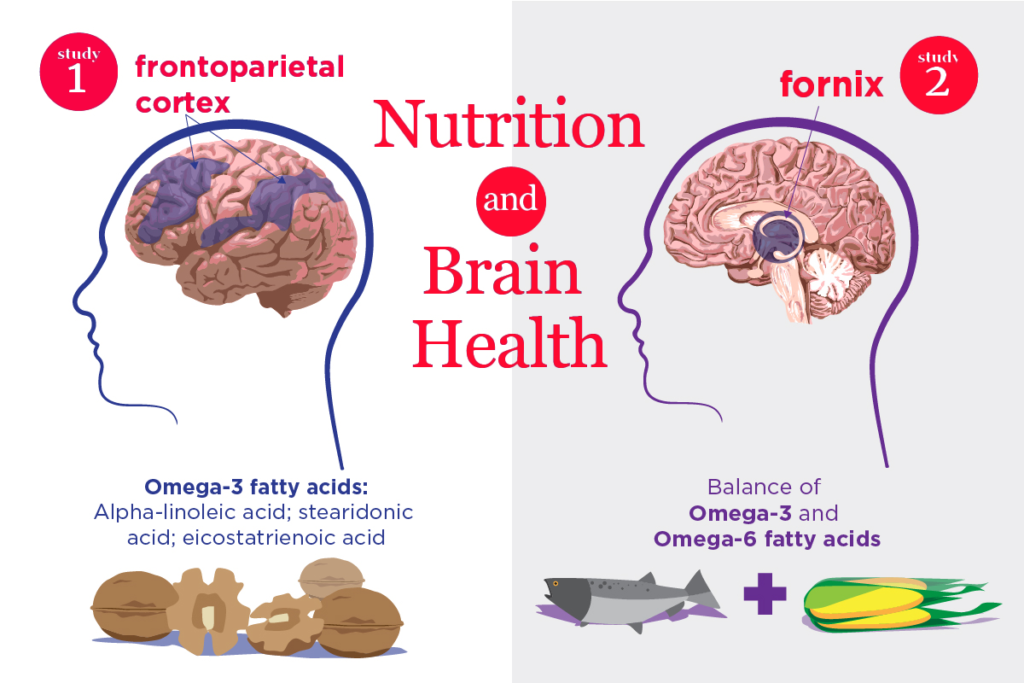
Physical Health Beyond Weight: A Lifelong Journey
The journey towards maintaining physical health extends far beyond weight management; it’s a lifelong commitment to nurturing the body. A balanced diet fuels this journey, providing the energy necessary for daily activities and the nutrients required for repairing and maintaining healthy body tissues and systems over a lifetime.

Prevention and Livelong Management of Chronic Diseases
A balanced diet plays a critical role in the lifelong prevention and management of chronic diseases. Lifelong dietary habits that focus on balance and nutritional richness can drastically reduce the risk of conditions such as diabetes, heart disease, and hypertension, proving that our dietary choices have a profound and lasting impact on our health.
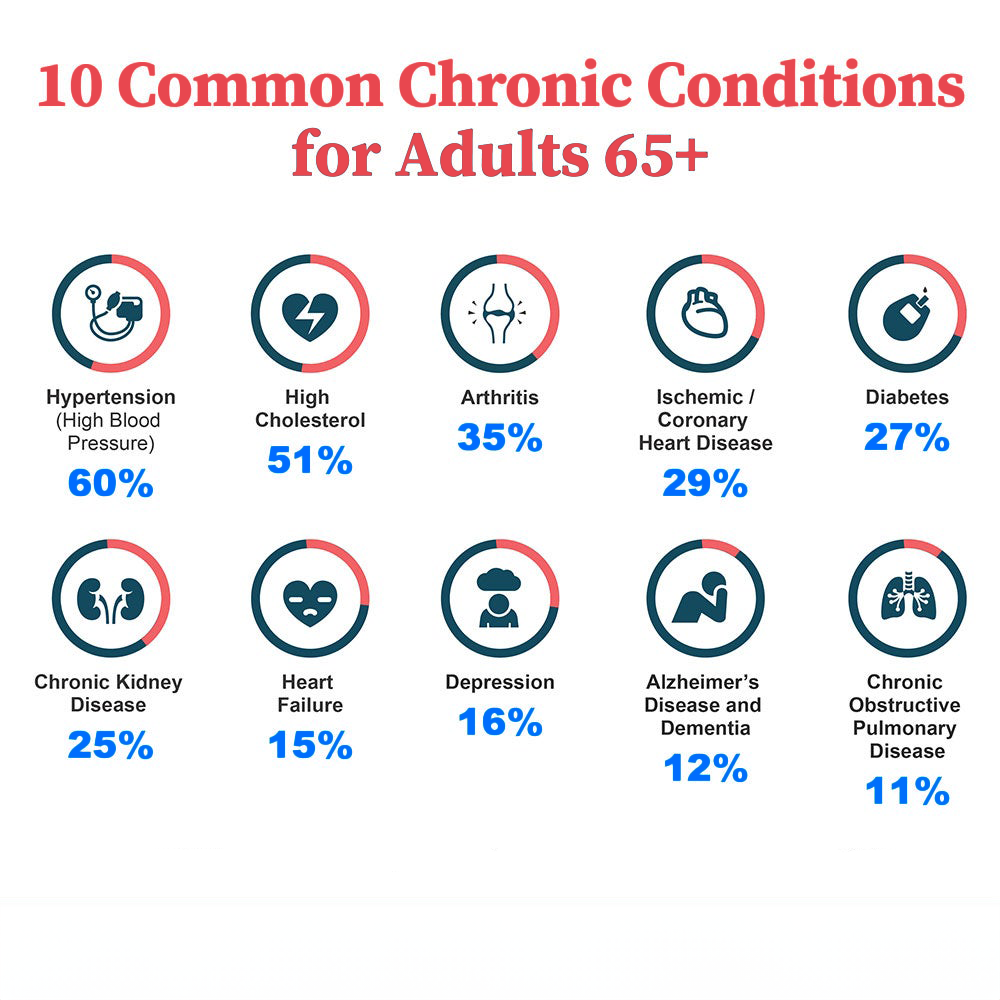
Conclusion and Livelong Dietary Recommendations
Embracing a balanced diet is not a temporary phase but a lifelong commitment to health and vitality. Lifelong adherence to a balanced diet offers immeasurable benefits, underscoring the importance of making informed, healthful dietary choices. To embark on this lifelong journey, start by incorporating a diverse range of nutrient-rich foods into your diet, focusing on the long-term benefits of sustained health and well-being.
By prioritizing a balanced diet, we make a powerful choice to support our health, not just in the present moment but throughout the entirety of our lives. This lifelong approach to nutrition is essential for fostering a healthy, fulfilling life, filled with vitality and devoid of preventable diseases.https://www.who.int/news-room/fact-sheets/detail/healthy-diet

A harmonious intake of macronutrients—namely carbohydrates, proteins, and fats—plays a pivotal role in maintaining and optimising our energy levels throughout the day. This balanced approach not only fuels our bodily functions but also supports sustained energy, mental clarity, and overall health.
Complex Carbohydrates: The Sustained Energy Source
Complex carbohydrates are integral to this balance. Found in foods such as whole grains, vegetables, and legumes, they are distinguished by their long chains of sugar molecules, which the body breaks down gradually. This slow digestion process ensures a steady release of glucose into the bloodstream, providing a constant energy supply. Unlike simple carbohydrates, which can lead to spikes and crashes in blood sugar levels, complex carbohydrates maintain energy stability, keeping lethargy at bay.
Lean Proteins: The Building Blocks of Energy
Proteins, particularly lean proteins found in chicken, fish, legumes, and tofu, are crucial for more than just muscle repair and growth. They also contribute to energy levels by facilitating the slow release of energy, much like complex carbohydrates, albeit through different mechanisms. Proteins take longer to digest, helping to stabilise blood sugar levels and thus energy throughout the day. Additionally, proteins are involved in the production of enzymes and hormones that play roles in energy metabolism, further underscoring their importance in a balanced diet.
Healthy Fats: The Concentrated Energy Reserve
Healthy fats, including those from avocados, nuts, seeds, and oily fish, are dense sources of energy. Providing more than double the energy per gram compared to carbohydrates and proteins, fats are essential in fueling longer-duration activities. Moreover, fats are necessary for absorbing fat-soluble vitamins (A, D, E, and K), which are vital for energy production at the cellular level. Incorporating healthy fats into the diet ensures that the body has access to a concentrated energy reserve, aiding in sustained performance and endurance throughout the day.
The Synergy of Macronutrients for Optimised Energy
The key to optimising energy levels lies not just in consuming these macronutrients in isolation but in their balanced intake. A diet that incorporates a mix of complex carbohydrates, lean proteins, and healthy fats ensures that the body is supplied with all forms of energy, suitable for immediate use and stored reserves. This balanced approach not only supports physical activities ranging from daily tasks to intense workouts but also benefits cognitive functions by providing a steady energy supply to the brain.
In summary, a balanced intake of macronutrients—complex carbohydrates for sustained energy release, lean proteins for stabilising blood sugar, and healthy fats for concentrated energy reserves—forms the foundation of optimal energy levels throughout the day. This nutritional strategy not only supports physical endurance and mental clarity but also contributes to long-term health and well-being, highlighting the profound impact of diet on our daily lives.
The Connection Between Diet and Sleep
Our diet influences our sleep through various pathways, including the impact on our body’s internal clock, or circadian rhythm, and the production of hormones and neurotransmitters that regulate sleep. For instance, certain nutrients can either promote the production of sleep-inducing hormones like melatonin or interfere with sleep by stimulating the central nervous system.
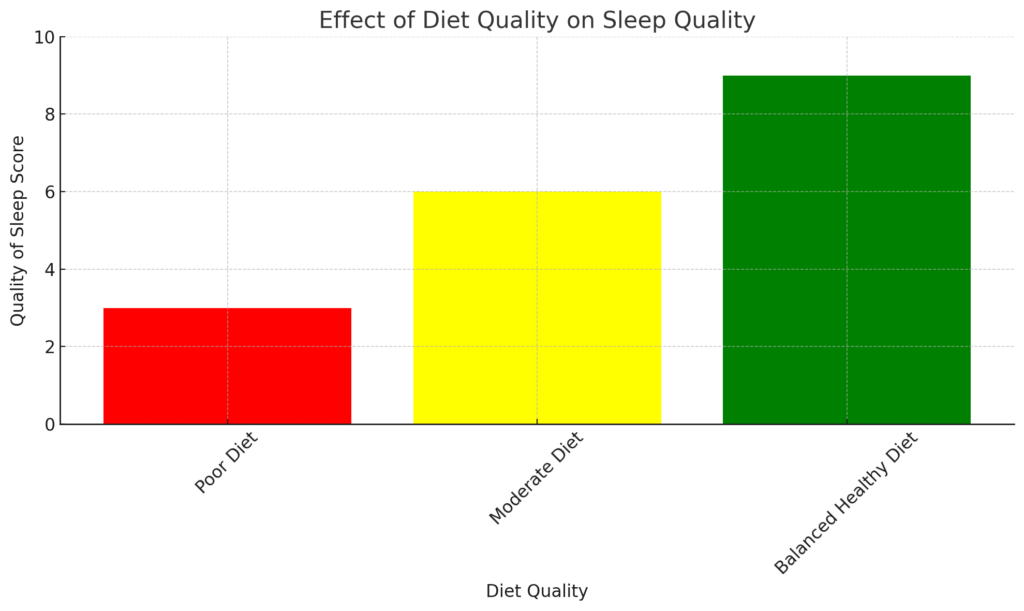
Foods That Promote Sleep
Incorporating specific foods into our diet can be a natural way to improve sleep quality. These foods are rich in compounds that support the sleep cycle, including magnesium, melatonin, tryptophan, and complex carbohydrates:
- Magnesium-Rich Foods: Magnesium is a mineral that plays a crucial role in relaxing the body and mind, making it easier to fall asleep. Foods high in magnesium include leafy greens (such as spinach and kale), nuts (especially almonds and cashews), seeds (pumpkin seeds, for example), and whole grains.
- Melatonin-Containing Foods: Melatonin is known as the “sleep hormone” because of its effect on regulating sleep patterns. While our bodies produce melatonin naturally, consuming foods that contain melatonin can help increase its levels and improve sleep quality. Examples include cherries, grapes, walnuts, and tomatoes.
- Tryptophan-Enriched Foods: Tryptophan is an amino acid that the body uses to produce serotonin, a neurotransmitter that is then converted into melatonin. Foods rich in tryptophan include poultry (such as turkey and chicken), dairy products, eggs, nuts, and seeds.
- Complex Carbohydrates: Consuming complex carbohydrates like whole grains, vegetables, and beans can also promote better sleep. These foods help to gradually increase the level of tryptophan in the brain by affecting insulin levels, thereby facilitating the production of melatonin.
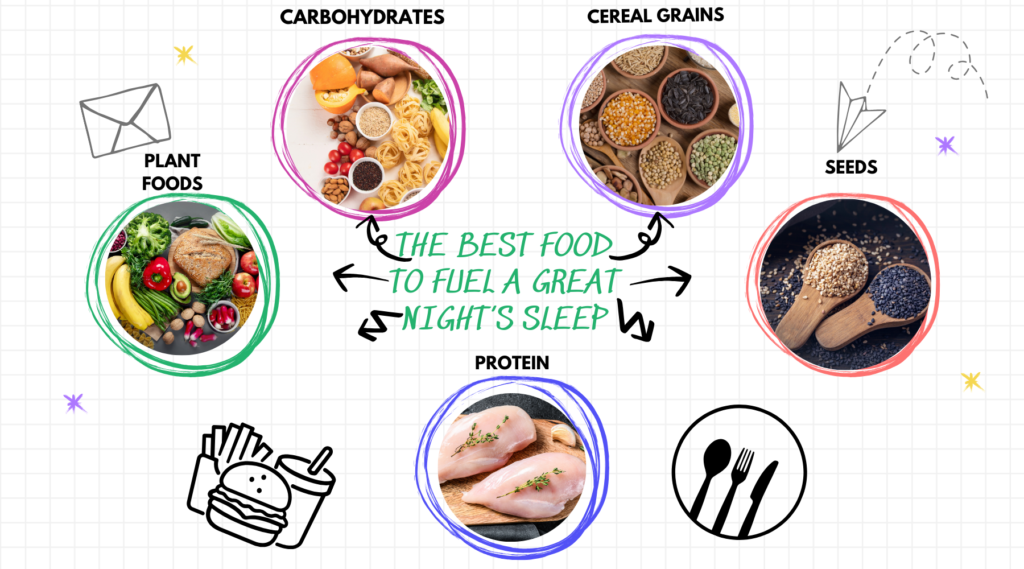
The Impact of Balanced Meals on Sleep
Eating balanced meals that include a combination of these sleep-promoting foods can help regulate sleep patterns and improve the quality of rest. It’s also important to consider the timing of meals, as eating heavy or large meals too close to bedtime can disrupt sleep. Ideally, meals should be consumed at least a few hours before bed to allow the body adequate time to digest.
Additionally, limiting the intake of caffeine and alcohol, which can significantly impair sleep quality, is crucial for those struggling with sleep issues. While caffeine is a known stimulant, alcohol, although it may initially induce drowsiness, disrupts the sleep cycle, leading to fragmented and unrefreshing sleep.
In conclusion, the relationship between diet and sleep is both complex and significant. By prioritizing foods that are rich in sleep-supportive nutrients and adopting healthy eating patterns, we can enhance our sleep quality. This, in turn, supports our overall health and well-being, demonstrating the power of dietary choices in influencing one of the most critical aspects of our lives: our sleep.
Reducing the Risk of Chronic Diseases through Dietary Choices
In our quest for a healthier life, understanding the profound impact of our dietary choices on preventing chronic diseases is crucial. Chronic diseases such as heart disease, diabetes, and certain cancers pose significant health challenges worldwide. However, a wealth of research suggests that adopting a balanced diet can play a pivotal role in reducing the risk of these diseases. This article delves into how a balanced diet influences our health and references major studies that support dietary guidelines for disease prevention.
The Power of a Balanced Diet
A balanced diet consists of the right proportions of carbohydrates, proteins, fats, vitamins, minerals, and water necessary to maintain good health and normal bodily function. This nutritional balance is key to preventing chronic diseases for several reasons.
- Heart Disease Prevention: Consuming a diet low in saturated fats and cholesterol, and rich in fruits, vegetables, whole grains, and lean protein can help reduce the risk of heart disease. The American Heart Association advocates for a diet that includes a variety of fruits and vegetables, whole grains, low-fat dairy products, skinless poultry and fish, nuts and legumes, and non-tropical vegetable oils to maintain heart health.
- Diabetes Management: A balanced diet can also mitigate the risk of developing type 2 diabetes. Foods with a low glycaemic index (GI) are particularly beneficial as they cause a slower rise in blood sugar levels. According to the American Diabetes Association, a diet rich in dietary fibre (especially from whole grains and fruits) and low in added sugars and saturated fats can prevent or help manage diabetes.
- Cancer Risk Reduction: Certain dietary practices can reduce the risk of developing some types of cancer. For instance, a diet high in fruits and vegetables has been linked to a lower risk of several types of cancer. The World Cancer Research Fund and the American Institute for Cancer Research recommend a plant-based diet as part of a cancer prevention strategy, emphasizing foods rich in antioxidants and fibres, such as fruits, vegetables, whole grains, and beans.
Supporting Studies and Guidelines
Several landmark studies underscore the importance of dietary choices in disease prevention. The Mediterranean Diet, for instance, has been extensively studied for its benefits in reducing the risk of heart disease and cancer. Research published in the New England Journal of Medicine highlighted that adhering to a Mediterranean diet rich in olive oil, nuts, beans, fish, fruits, and vegetables significantly reduced the incidence of major cardiovascular events among high-risk individuals.
Furthermore, the Diabetes Prevention Program (DPP) study demonstrated that lifestyle interventions, including diet and exercise, can effectively reduce the development of diabetes by 58% in individuals with prediabetes.
Dietary guidelines issued by health organizations worldwide are grounded in scientific evidence from these and other studies. They consistently emphasize the importance of a balanced diet and moderate physical activity in preventing chronic diseases.
The last decade has seen little progress in improving diets
Food intake by food group, year and region (grams per person per day), 2010 and 2018
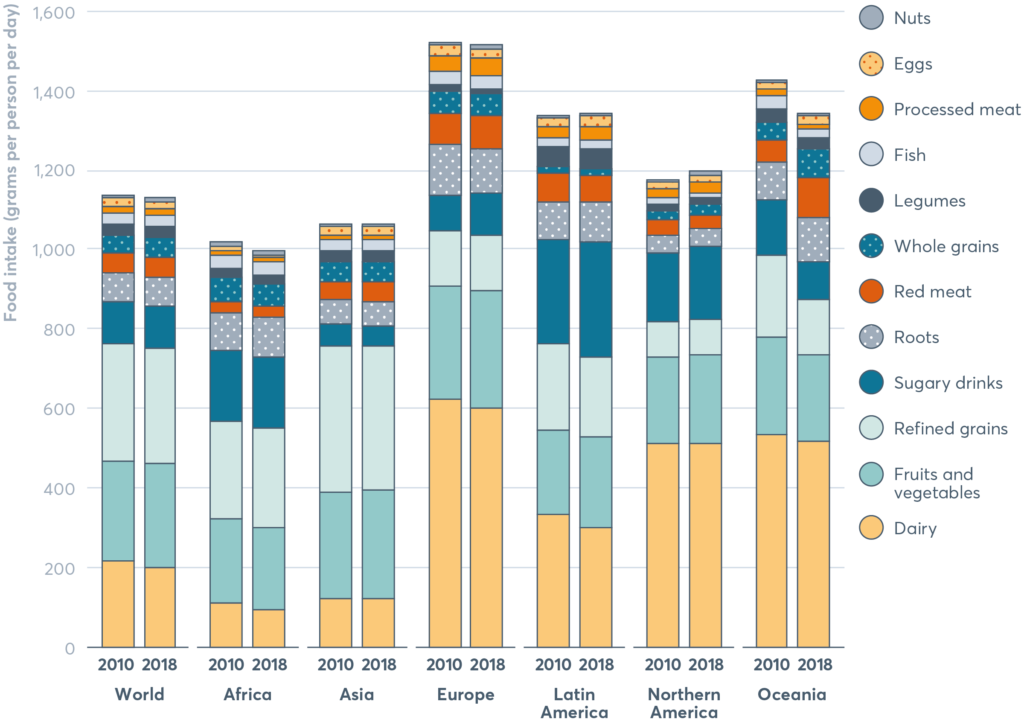
Adopting a balanced diet is a powerful strategy for reducing the risk of heart disease, diabetes, and some cancers. The evidence from major studies is compelling, highlighting dietary modification as a key component of disease prevention efforts. By focusing on a variety of nutrient-rich foods and adhering to established dietary guidelines, individuals can make significant strides towards achieving and maintaining optimal health. It’s a reminder that, in many cases, prevention is within our control, and it starts with what we put on our plate.
Enhancing Lifelong Health: The Role of a Balanced Diet in Chronic Disease Prevention and Better Weight Management
In the journey towards lifelong health, the importance of dietary choices cannot be overstated. A balanced diet is not only crucial for reducing the risk of chronic diseases such as heart disease, diabetes, and certain cancers but also plays a significant role in achieving and maintaining a healthy weight. This concept is key to understanding how lifestyle adjustments can lead to lifelong benefits, promoting wellness and preventing illness. Below, we integrate the concept of better weight management with the broader advantages of a balanced diet, underscoring the importance of adopting these practices for a lifetime of health.
Better Weight Management: A Lifelong Approach
When considering weight management, the focus should not solely lie on weight loss but rather on achieving and maintaining a healthy weight over one’s lifetime. A balanced diet is instrumental in this regard, providing the body with the necessary nutrients while avoiding excessive caloric intake. This approach goes beyond the simple equation of calories in versus calories out, emphasizing the quality of the calories consumed.
Nutrient Density versus Caloric Density: Understanding the distinction between nutrient density and caloric density is essential for lifelong weight management. Nutrient-dense foods provide a high amount of vitamins, minerals, and other beneficial nutrients relative to their caloric content. Examples include fruits, vegetables, whole grains, and lean proteins. Conversely, foods with high caloric density offer many calories with few nutritional benefits, such as processed snacks, sugary beverages, and fast food. By choosing nutrient-dense options, individuals can satisfy their nutritional needs without consuming excess calories, aiding in weight management and reducing the risk of chronic diseases.
Lifelong Benefits of a Balanced Diet
The advantages of a balanced diet extend far beyond weight management. As previously discussed, a diet rich in fruits, vegetables, whole grains, and lean proteins can significantly reduce the risk of heart disease, diabetes, and certain cancers. Studies, such as those examining the Mediterranean Diet and the findings of the Diabetes Prevention Program (DPP), provide robust evidence supporting the role of dietary choices in disease prevention.
Conclusion: Embracing a Lifelong Commitment to Health
Recapping the main benefits of a balanced diet highlights its central role in promoting health and preventing disease. From reducing the risk of chronic conditions to aiding in lifelong weight management, the advantages of making informed dietary choices are clear. As we consider these benefits, let them serve as motivation for adopting and maintaining a balanced diet. It’s about making a commitment to oneself, to prioritise health and well-being throughout one’s life. Let the concept of lifelong health guide you towards making choices that support a vibrant and fulfilling life, demonstrating that prevention, indeed, begins on your plate.

What i don’t understood is in reality how you’re now not really a lot more smartly-favored than you might be now. You’re very intelligent. You understand therefore significantly in terms of this topic, produced me personally believe it from a lot of numerous angles. Its like women and men are not interested except it is one thing to accomplish with Woman gaga! Your own stuffs outstanding. Always care for it up!